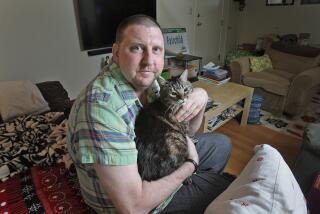‘No Other Option’ for Heart Recipient
- Share via
WASHINGTON — Doctors who successfully implanted the first fully self-contained artificial heart in a human provided the first sparse details about its recipient Wednesday, describing a man in his mid- to late-50s, in “dire” condition, close to death from heart disease, diabetes and chronic kidney failure.
Keeping his identity and hometown a secret, as requested by his family, the doctors said the man had suffered multiple previous heart attacks and had undergone coronary bypass surgery about nine years ago. They said he was not a candidate for a heart transplant.
“He had no other option,” Dr. Laman Gray told reporters during a televised briefing at Jewish Hospital in Louisville, where the seven-hour operation was performed Monday. “He was in as dire shape as you can ever have anybody in.”
The hospital said the man had awakened about four hours after surgery and was resting comfortably. The doctors said he had been responsive to family members Tuesday night, although he had not been able to speak because of a ventilator that is helping him breathe. Doctors planned to begin weaning him from the ventilator Wednesday.
Like many terminally ill research subjects, the man chose to try to extend his life rather than face an estimated 80% chance of dying within 30 days. But his doctors could not predict with any certainty how long he will survive with the new grapefruit-size titanium-and-plastic pump inside his chest.
His doctors have said they expected to extend his life only by about a month, but they refused to rule out the possibility, however remote, that the patient might someday leave the hospital, the new mechanical heart still pumping in his body.
Dr. Robert D. Dowling, who participated in the surgery, said of the procedure: “It went very smoothly and very quickly.”
Since the surgery, “the patient has done well,” said Gray, head of cardiology at the University of Louisville. “He has done much better than Rob [Dowling] and I anticipated. He is currently neurologically normal. . . . He has kidney function.”
But, he added, “there are lots of problems and complications that can occur, and we can’t predict what the complications can be.”
Dr. Douglas Zipes, president of the American College of Cardiology, predicted that such devices--once perfected--ultimately could prolong or even save many lives.
“The short answer to that question is ‘Yes,’ ” he said. “The long answer is ‘When?’ ”
Like the first early heart transplant recipients, who lived only a matter of weeks with donor hearts, this first “important baby step” may “help the patient [only] a bit,” said Zipes, who was not involved with the surgery. “But it will help the scientists a lot.” Some patients now live as long as 30 years with transplanted hearts.
Scientists have labored for decades to create the perfect artificial heart, which underscores “the wonderfully complex function of the human heart,” Zipes said. “This is an incredible organ, and to try to replace it is very, very difficult to do, with many problems to solve.”
The device used in Monday’s procedure, called AbioCor, is manufactured by Abiomed Inc. of Danvers, Mass., and has electronic controls that adjust the pumping speed based on the body’s needs. Its 4-pound battery packs are worn outside the body and transmit power through the skin without wires or other connections.
The heart also has a rechargeable internal battery, about the size of a pager, that can work on its own for about 30 minutes.
The device represents a major technological advance from the mechanical hearts used in the 1980s. Those had to be tethered to bulky and inconvenient outside power sources.
Earlier this year, the Food and Drug Administration gave the go-ahead to five hospitals, including UCLA Medical Center, to implant the experimental device into patients.
It is intended to be a permanent replacement for the man’s failing heart, with the hope that someday it will allow recipients to lead a relatively normal life, said John Watson of the National Heart, Lung, and Blood Institute, which has awarded $20 million in grants for research into self-contained artificial hearts.
The surgical team has implanted similar devices in 40 baby cows, all with no serious defects, although the animals had to be killed when they outgrew the devices. The devices also have been operating nonstop in a laboratory for more than a year, Dowling said.
However, all of the animals were in good health, while the human patients who are candidates for the device are not.
“These patients are so ill that it is very likely that one or more may not survive the 60-day period even if the device functions perfectly well,” Dowling said.
The surgeons said no additional patients have been identified and they refused to speculate about when a second implant surgery might occur.
More to Read
Sign up for Essential California
The most important California stories and recommendations in your inbox every morning.
You may occasionally receive promotional content from the Los Angeles Times.













